Influence of Culture, Politics, and Power on Organizational Behavior
VerifiedAdded on 2022/12/29
|15
|4726
|25
AI Summary
This document discusses the influence of culture, politics, and power on individual and team behavior and performance in an organizational context. It also evaluates the role of content and process theories of motivation in achieving organizational goals.
Contribute Materials
Your contribution can guide someone’s learning journey. Share your
documents today.
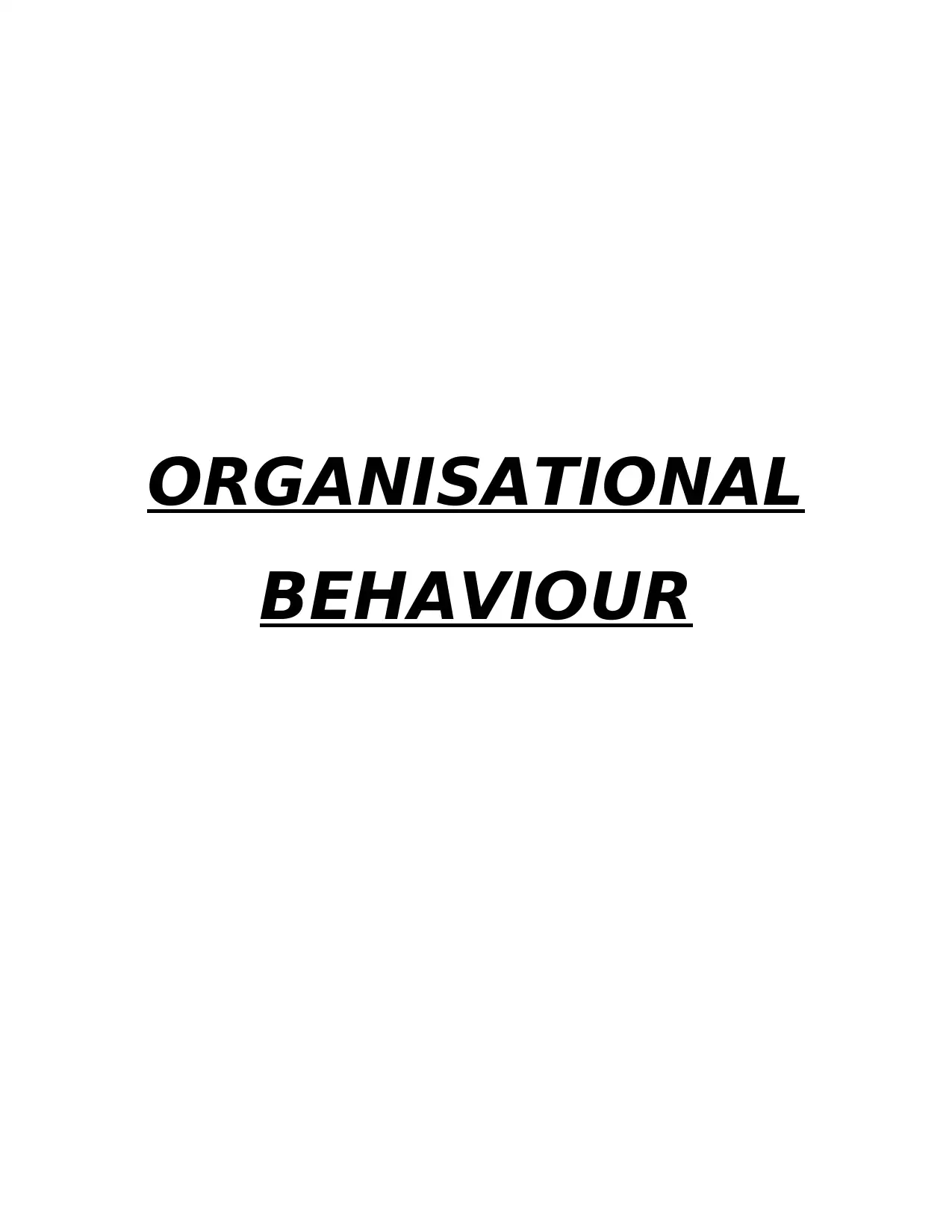
ORGANISATIONAL
BEHAVIOUR
BEHAVIOUR
Secure Best Marks with AI Grader
Need help grading? Try our AI Grader for instant feedback on your assignments.
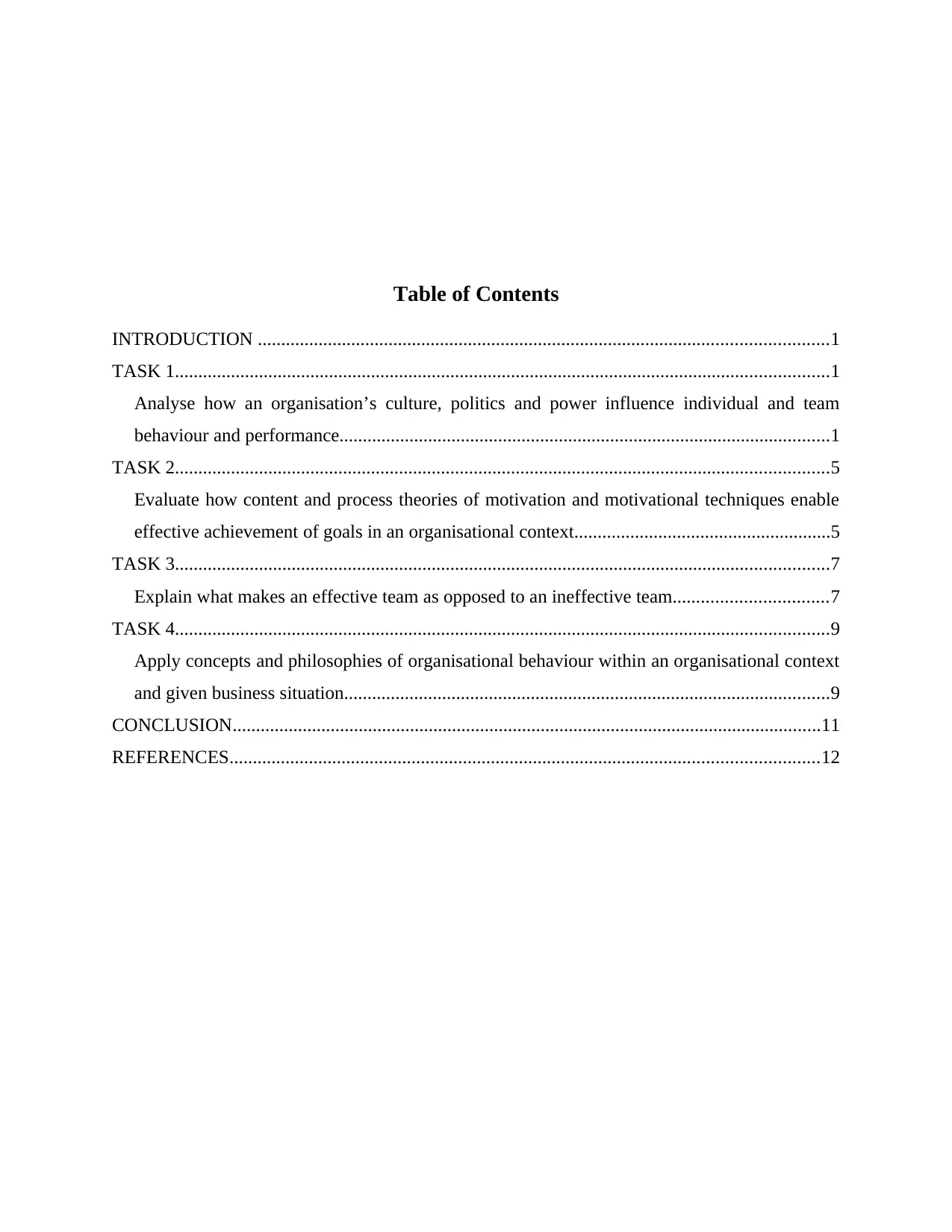
Table of Contents
INTRODUCTION ..........................................................................................................................1
TASK 1............................................................................................................................................1
Analyse how an organisation’s culture, politics and power influence individual and team
behaviour and performance.........................................................................................................1
TASK 2............................................................................................................................................5
Evaluate how content and process theories of motivation and motivational techniques enable
effective achievement of goals in an organisational context.......................................................5
TASK 3............................................................................................................................................7
Explain what makes an effective team as opposed to an ineffective team.................................7
TASK 4............................................................................................................................................9
Apply concepts and philosophies of organisational behaviour within an organisational context
and given business situation........................................................................................................9
CONCLUSION..............................................................................................................................11
REFERENCES..............................................................................................................................12
INTRODUCTION ..........................................................................................................................1
TASK 1............................................................................................................................................1
Analyse how an organisation’s culture, politics and power influence individual and team
behaviour and performance.........................................................................................................1
TASK 2............................................................................................................................................5
Evaluate how content and process theories of motivation and motivational techniques enable
effective achievement of goals in an organisational context.......................................................5
TASK 3............................................................................................................................................7
Explain what makes an effective team as opposed to an ineffective team.................................7
TASK 4............................................................................................................................................9
Apply concepts and philosophies of organisational behaviour within an organisational context
and given business situation........................................................................................................9
CONCLUSION..............................................................................................................................11
REFERENCES..............................................................................................................................12
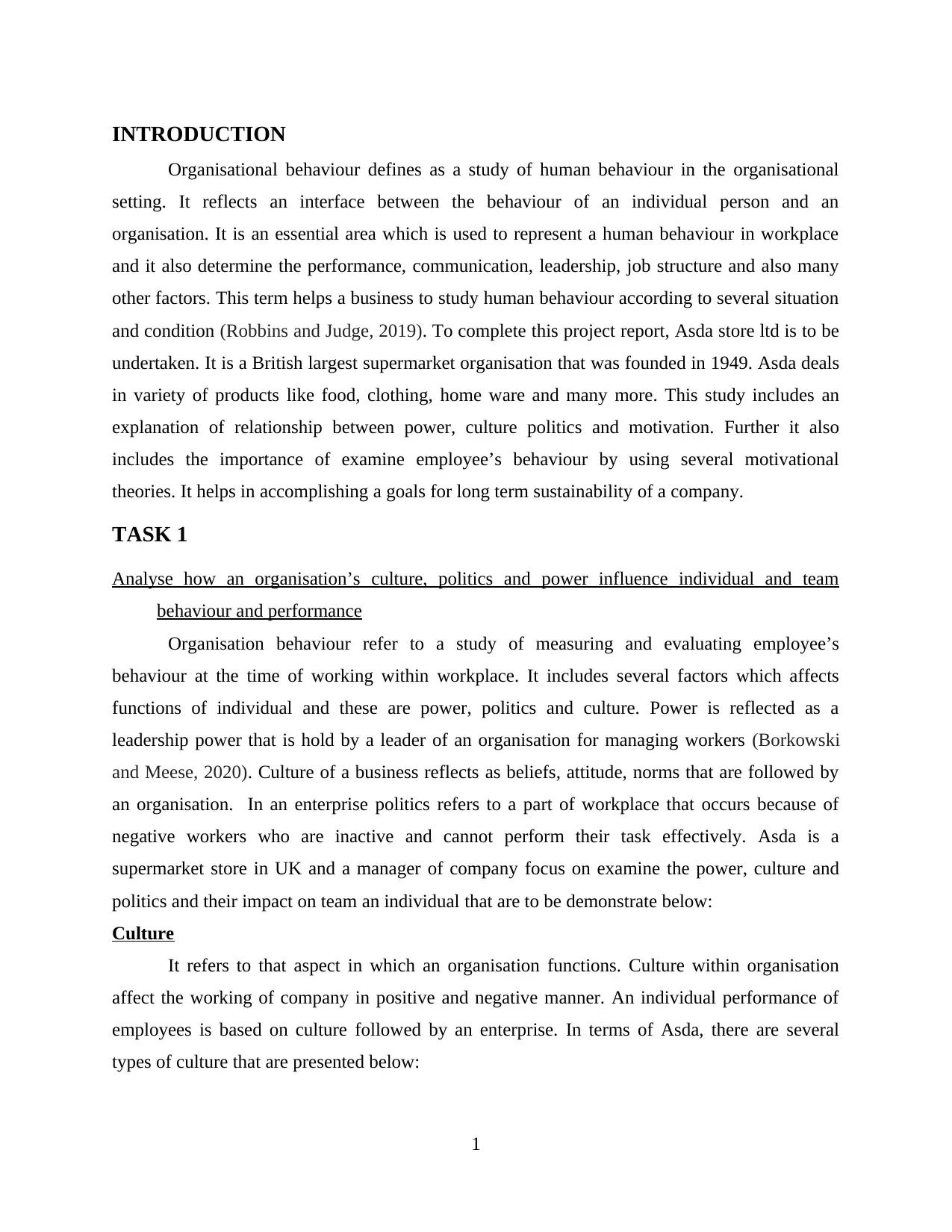
INTRODUCTION
Organisational behaviour defines as a study of human behaviour in the organisational
setting. It reflects an interface between the behaviour of an individual person and an
organisation. It is an essential area which is used to represent a human behaviour in workplace
and it also determine the performance, communication, leadership, job structure and also many
other factors. This term helps a business to study human behaviour according to several situation
and condition (Robbins and Judge, 2019). To complete this project report, Asda store ltd is to be
undertaken. It is a British largest supermarket organisation that was founded in 1949. Asda deals
in variety of products like food, clothing, home ware and many more. This study includes an
explanation of relationship between power, culture politics and motivation. Further it also
includes the importance of examine employee’s behaviour by using several motivational
theories. It helps in accomplishing a goals for long term sustainability of a company.
TASK 1
Analyse how an organisation’s culture, politics and power influence individual and team
behaviour and performance
Organisation behaviour refer to a study of measuring and evaluating employee’s
behaviour at the time of working within workplace. It includes several factors which affects
functions of individual and these are power, politics and culture. Power is reflected as a
leadership power that is hold by a leader of an organisation for managing workers (Borkowski
and Meese, 2020). Culture of a business reflects as beliefs, attitude, norms that are followed by
an organisation. In an enterprise politics refers to a part of workplace that occurs because of
negative workers who are inactive and cannot perform their task effectively. Asda is a
supermarket store in UK and a manager of company focus on examine the power, culture and
politics and their impact on team an individual that are to be demonstrate below:
Culture
It refers to that aspect in which an organisation functions. Culture within organisation
affect the working of company in positive and negative manner. An individual performance of
employees is based on culture followed by an enterprise. In terms of Asda, there are several
types of culture that are presented below:
1
Organisational behaviour defines as a study of human behaviour in the organisational
setting. It reflects an interface between the behaviour of an individual person and an
organisation. It is an essential area which is used to represent a human behaviour in workplace
and it also determine the performance, communication, leadership, job structure and also many
other factors. This term helps a business to study human behaviour according to several situation
and condition (Robbins and Judge, 2019). To complete this project report, Asda store ltd is to be
undertaken. It is a British largest supermarket organisation that was founded in 1949. Asda deals
in variety of products like food, clothing, home ware and many more. This study includes an
explanation of relationship between power, culture politics and motivation. Further it also
includes the importance of examine employee’s behaviour by using several motivational
theories. It helps in accomplishing a goals for long term sustainability of a company.
TASK 1
Analyse how an organisation’s culture, politics and power influence individual and team
behaviour and performance
Organisation behaviour refer to a study of measuring and evaluating employee’s
behaviour at the time of working within workplace. It includes several factors which affects
functions of individual and these are power, politics and culture. Power is reflected as a
leadership power that is hold by a leader of an organisation for managing workers (Borkowski
and Meese, 2020). Culture of a business reflects as beliefs, attitude, norms that are followed by
an organisation. In an enterprise politics refers to a part of workplace that occurs because of
negative workers who are inactive and cannot perform their task effectively. Asda is a
supermarket store in UK and a manager of company focus on examine the power, culture and
politics and their impact on team an individual that are to be demonstrate below:
Culture
It refers to that aspect in which an organisation functions. Culture within organisation
affect the working of company in positive and negative manner. An individual performance of
employees is based on culture followed by an enterprise. In terms of Asda, there are several
types of culture that are presented below:
1
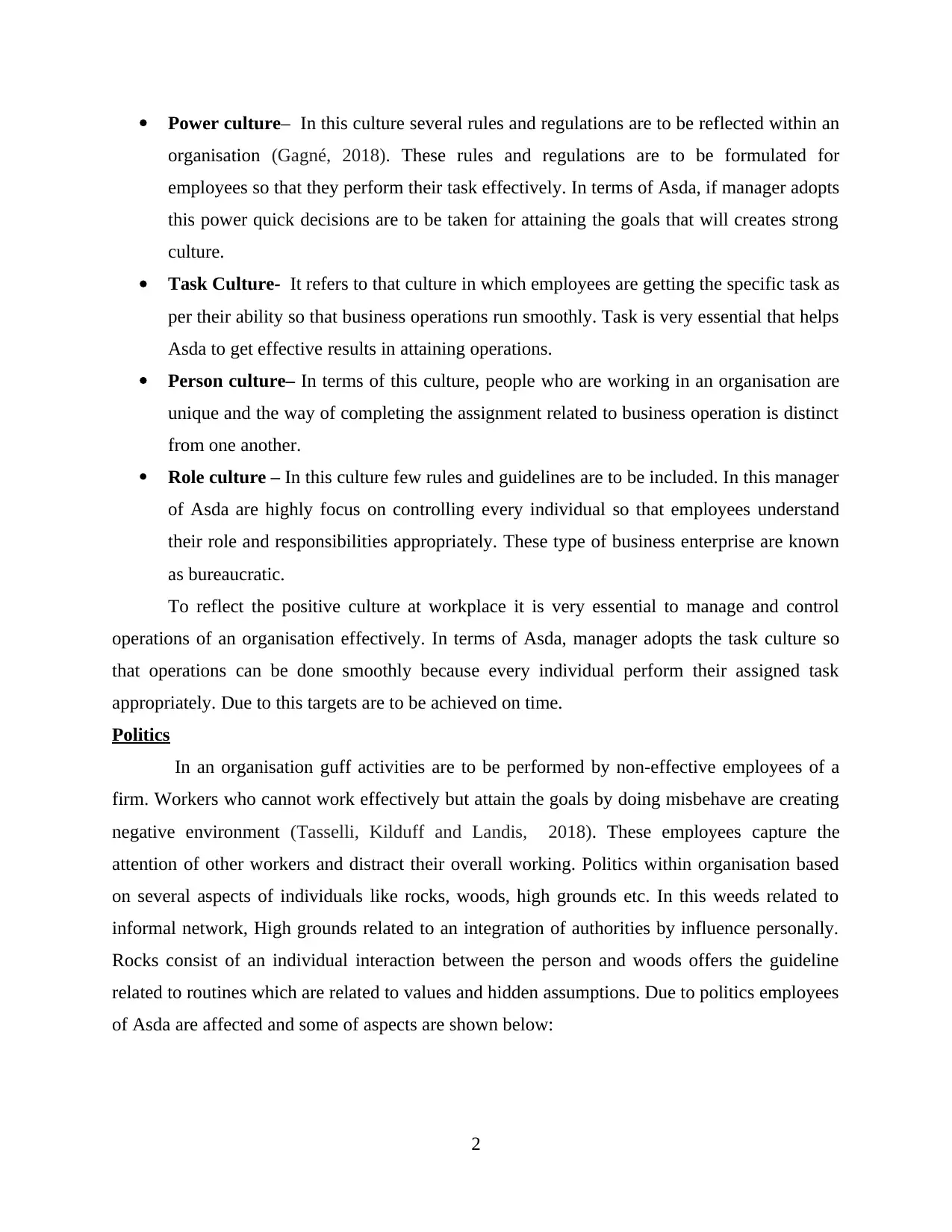
Power culture– In this culture several rules and regulations are to be reflected within an
organisation (Gagné, 2018). These rules and regulations are to be formulated for
employees so that they perform their task effectively. In terms of Asda, if manager adopts
this power quick decisions are to be taken for attaining the goals that will creates strong
culture.
Task Culture- It refers to that culture in which employees are getting the specific task as
per their ability so that business operations run smoothly. Task is very essential that helps
Asda to get effective results in attaining operations.
Person culture– In terms of this culture, people who are working in an organisation are
unique and the way of completing the assignment related to business operation is distinct
from one another.
Role culture – In this culture few rules and guidelines are to be included. In this manager
of Asda are highly focus on controlling every individual so that employees understand
their role and responsibilities appropriately. These type of business enterprise are known
as bureaucratic.
To reflect the positive culture at workplace it is very essential to manage and control
operations of an organisation effectively. In terms of Asda, manager adopts the task culture so
that operations can be done smoothly because every individual perform their assigned task
appropriately. Due to this targets are to be achieved on time.
Politics
In an organisation guff activities are to be performed by non-effective employees of a
firm. Workers who cannot work effectively but attain the goals by doing misbehave are creating
negative environment (Tasselli, Kilduff and Landis, 2018). These employees capture the
attention of other workers and distract their overall working. Politics within organisation based
on several aspects of individuals like rocks, woods, high grounds etc. In this weeds related to
informal network, High grounds related to an integration of authorities by influence personally.
Rocks consist of an individual interaction between the person and woods offers the guideline
related to routines which are related to values and hidden assumptions. Due to politics employees
of Asda are affected and some of aspects are shown below:
2
organisation (Gagné, 2018). These rules and regulations are to be formulated for
employees so that they perform their task effectively. In terms of Asda, if manager adopts
this power quick decisions are to be taken for attaining the goals that will creates strong
culture.
Task Culture- It refers to that culture in which employees are getting the specific task as
per their ability so that business operations run smoothly. Task is very essential that helps
Asda to get effective results in attaining operations.
Person culture– In terms of this culture, people who are working in an organisation are
unique and the way of completing the assignment related to business operation is distinct
from one another.
Role culture – In this culture few rules and guidelines are to be included. In this manager
of Asda are highly focus on controlling every individual so that employees understand
their role and responsibilities appropriately. These type of business enterprise are known
as bureaucratic.
To reflect the positive culture at workplace it is very essential to manage and control
operations of an organisation effectively. In terms of Asda, manager adopts the task culture so
that operations can be done smoothly because every individual perform their assigned task
appropriately. Due to this targets are to be achieved on time.
Politics
In an organisation guff activities are to be performed by non-effective employees of a
firm. Workers who cannot work effectively but attain the goals by doing misbehave are creating
negative environment (Tasselli, Kilduff and Landis, 2018). These employees capture the
attention of other workers and distract their overall working. Politics within organisation based
on several aspects of individuals like rocks, woods, high grounds etc. In this weeds related to
informal network, High grounds related to an integration of authorities by influence personally.
Rocks consist of an individual interaction between the person and woods offers the guideline
related to routines which are related to values and hidden assumptions. Due to politics employees
of Asda are affected and some of aspects are shown below:
2
Secure Best Marks with AI Grader
Need help grading? Try our AI Grader for instant feedback on your assignments.
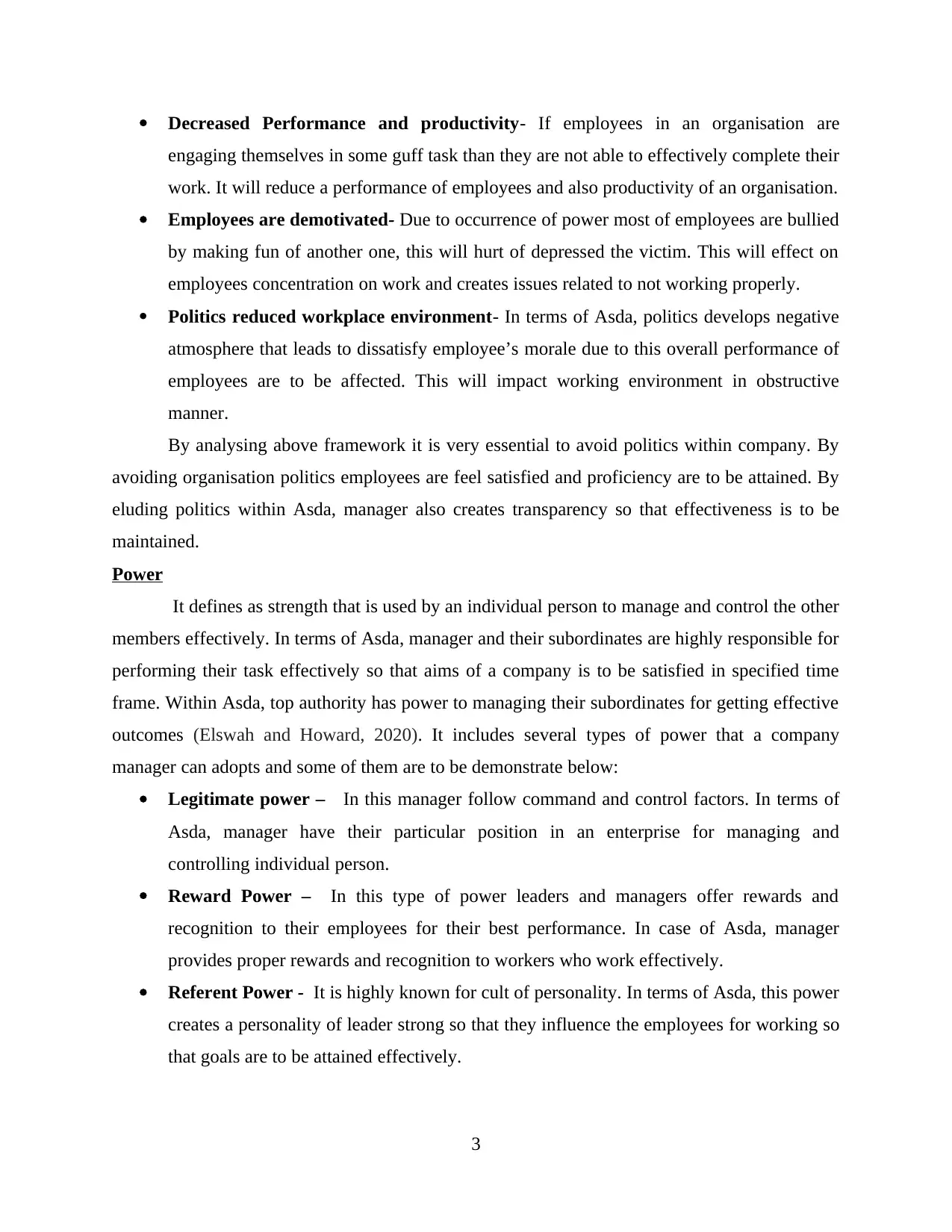
Decreased Performance and productivity- If employees in an organisation are
engaging themselves in some guff task than they are not able to effectively complete their
work. It will reduce a performance of employees and also productivity of an organisation.
Employees are demotivated- Due to occurrence of power most of employees are bullied
by making fun of another one, this will hurt of depressed the victim. This will effect on
employees concentration on work and creates issues related to not working properly.
Politics reduced workplace environment- In terms of Asda, politics develops negative
atmosphere that leads to dissatisfy employee’s morale due to this overall performance of
employees are to be affected. This will impact working environment in obstructive
manner.
By analysing above framework it is very essential to avoid politics within company. By
avoiding organisation politics employees are feel satisfied and proficiency are to be attained. By
eluding politics within Asda, manager also creates transparency so that effectiveness is to be
maintained.
Power
It defines as strength that is used by an individual person to manage and control the other
members effectively. In terms of Asda, manager and their subordinates are highly responsible for
performing their task effectively so that aims of a company is to be satisfied in specified time
frame. Within Asda, top authority has power to managing their subordinates for getting effective
outcomes (Elswah and Howard, 2020). It includes several types of power that a company
manager can adopts and some of them are to be demonstrate below:
Legitimate power – In this manager follow command and control factors. In terms of
Asda, manager have their particular position in an enterprise for managing and
controlling individual person.
Reward Power – In this type of power leaders and managers offer rewards and
recognition to their employees for their best performance. In case of Asda, manager
provides proper rewards and recognition to workers who work effectively.
Referent Power - It is highly known for cult of personality. In terms of Asda, this power
creates a personality of leader strong so that they influence the employees for working so
that goals are to be attained effectively.
3
engaging themselves in some guff task than they are not able to effectively complete their
work. It will reduce a performance of employees and also productivity of an organisation.
Employees are demotivated- Due to occurrence of power most of employees are bullied
by making fun of another one, this will hurt of depressed the victim. This will effect on
employees concentration on work and creates issues related to not working properly.
Politics reduced workplace environment- In terms of Asda, politics develops negative
atmosphere that leads to dissatisfy employee’s morale due to this overall performance of
employees are to be affected. This will impact working environment in obstructive
manner.
By analysing above framework it is very essential to avoid politics within company. By
avoiding organisation politics employees are feel satisfied and proficiency are to be attained. By
eluding politics within Asda, manager also creates transparency so that effectiveness is to be
maintained.
Power
It defines as strength that is used by an individual person to manage and control the other
members effectively. In terms of Asda, manager and their subordinates are highly responsible for
performing their task effectively so that aims of a company is to be satisfied in specified time
frame. Within Asda, top authority has power to managing their subordinates for getting effective
outcomes (Elswah and Howard, 2020). It includes several types of power that a company
manager can adopts and some of them are to be demonstrate below:
Legitimate power – In this manager follow command and control factors. In terms of
Asda, manager have their particular position in an enterprise for managing and
controlling individual person.
Reward Power – In this type of power leaders and managers offer rewards and
recognition to their employees for their best performance. In case of Asda, manager
provides proper rewards and recognition to workers who work effectively.
Referent Power - It is highly known for cult of personality. In terms of Asda, this power
creates a personality of leader strong so that they influence the employees for working so
that goals are to be attained effectively.
3
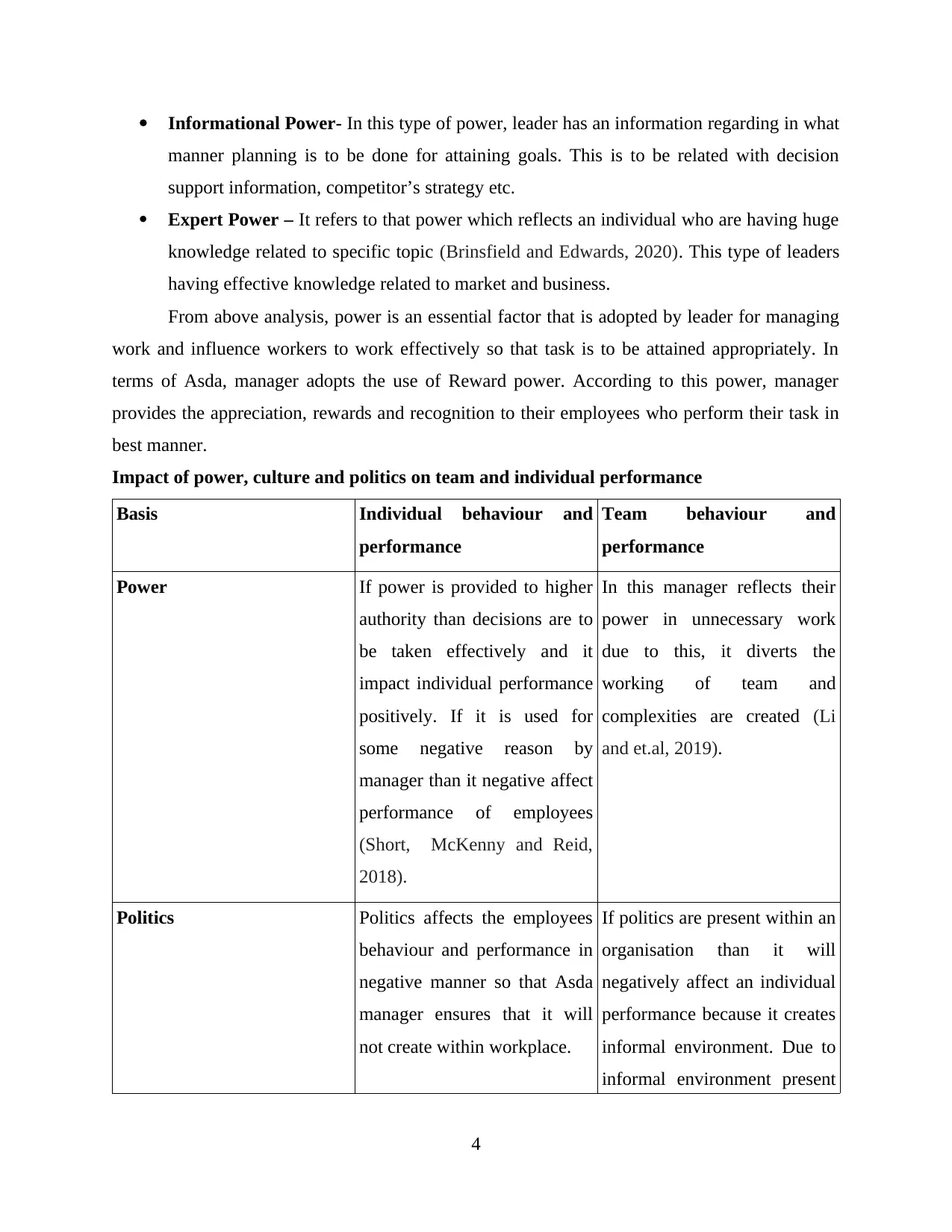
Informational Power- In this type of power, leader has an information regarding in what
manner planning is to be done for attaining goals. This is to be related with decision
support information, competitor’s strategy etc.
Expert Power – It refers to that power which reflects an individual who are having huge
knowledge related to specific topic (Brinsfield and Edwards, 2020). This type of leaders
having effective knowledge related to market and business.
From above analysis, power is an essential factor that is adopted by leader for managing
work and influence workers to work effectively so that task is to be attained appropriately. In
terms of Asda, manager adopts the use of Reward power. According to this power, manager
provides the appreciation, rewards and recognition to their employees who perform their task in
best manner.
Impact of power, culture and politics on team and individual performance
Basis Individual behaviour and
performance
Team behaviour and
performance
Power If power is provided to higher
authority than decisions are to
be taken effectively and it
impact individual performance
positively. If it is used for
some negative reason by
manager than it negative affect
performance of employees
(Short, McKenny and Reid,
2018).
In this manager reflects their
power in unnecessary work
due to this, it diverts the
working of team and
complexities are created (Li
and et.al, 2019).
Politics Politics affects the employees
behaviour and performance in
negative manner so that Asda
manager ensures that it will
not create within workplace.
If politics are present within an
organisation than it will
negatively affect an individual
performance because it creates
informal environment. Due to
informal environment present
4
manner planning is to be done for attaining goals. This is to be related with decision
support information, competitor’s strategy etc.
Expert Power – It refers to that power which reflects an individual who are having huge
knowledge related to specific topic (Brinsfield and Edwards, 2020). This type of leaders
having effective knowledge related to market and business.
From above analysis, power is an essential factor that is adopted by leader for managing
work and influence workers to work effectively so that task is to be attained appropriately. In
terms of Asda, manager adopts the use of Reward power. According to this power, manager
provides the appreciation, rewards and recognition to their employees who perform their task in
best manner.
Impact of power, culture and politics on team and individual performance
Basis Individual behaviour and
performance
Team behaviour and
performance
Power If power is provided to higher
authority than decisions are to
be taken effectively and it
impact individual performance
positively. If it is used for
some negative reason by
manager than it negative affect
performance of employees
(Short, McKenny and Reid,
2018).
In this manager reflects their
power in unnecessary work
due to this, it diverts the
working of team and
complexities are created (Li
and et.al, 2019).
Politics Politics affects the employees
behaviour and performance in
negative manner so that Asda
manager ensures that it will
not create within workplace.
If politics are present within an
organisation than it will
negatively affect an individual
performance because it creates
informal environment. Due to
informal environment present
4
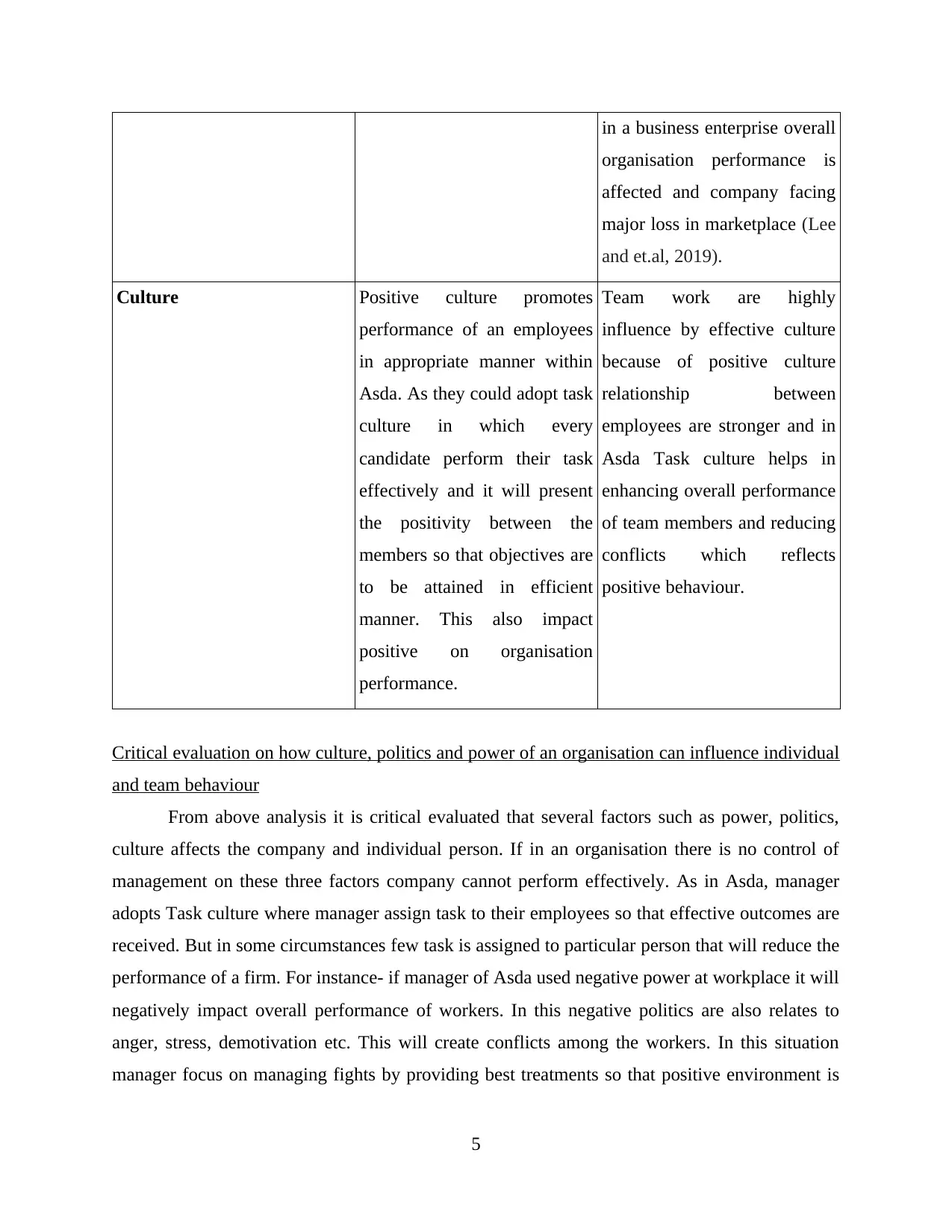
in a business enterprise overall
organisation performance is
affected and company facing
major loss in marketplace (Lee
and et.al, 2019).
Culture Positive culture promotes
performance of an employees
in appropriate manner within
Asda. As they could adopt task
culture in which every
candidate perform their task
effectively and it will present
the positivity between the
members so that objectives are
to be attained in efficient
manner. This also impact
positive on organisation
performance.
Team work are highly
influence by effective culture
because of positive culture
relationship between
employees are stronger and in
Asda Task culture helps in
enhancing overall performance
of team members and reducing
conflicts which reflects
positive behaviour.
Critical evaluation on how culture, politics and power of an organisation can influence individual
and team behaviour
From above analysis it is critical evaluated that several factors such as power, politics,
culture affects the company and individual person. If in an organisation there is no control of
management on these three factors company cannot perform effectively. As in Asda, manager
adopts Task culture where manager assign task to their employees so that effective outcomes are
received. But in some circumstances few task is assigned to particular person that will reduce the
performance of a firm. For instance- if manager of Asda used negative power at workplace it will
negatively impact overall performance of workers. In this negative politics are also relates to
anger, stress, demotivation etc. This will create conflicts among the workers. In this situation
manager focus on managing fights by providing best treatments so that positive environment is
5
organisation performance is
affected and company facing
major loss in marketplace (Lee
and et.al, 2019).
Culture Positive culture promotes
performance of an employees
in appropriate manner within
Asda. As they could adopt task
culture in which every
candidate perform their task
effectively and it will present
the positivity between the
members so that objectives are
to be attained in efficient
manner. This also impact
positive on organisation
performance.
Team work are highly
influence by effective culture
because of positive culture
relationship between
employees are stronger and in
Asda Task culture helps in
enhancing overall performance
of team members and reducing
conflicts which reflects
positive behaviour.
Critical evaluation on how culture, politics and power of an organisation can influence individual
and team behaviour
From above analysis it is critical evaluated that several factors such as power, politics,
culture affects the company and individual person. If in an organisation there is no control of
management on these three factors company cannot perform effectively. As in Asda, manager
adopts Task culture where manager assign task to their employees so that effective outcomes are
received. But in some circumstances few task is assigned to particular person that will reduce the
performance of a firm. For instance- if manager of Asda used negative power at workplace it will
negatively impact overall performance of workers. In this negative politics are also relates to
anger, stress, demotivation etc. This will create conflicts among the workers. In this situation
manager focus on managing fights by providing best treatments so that positive environment is
5
Paraphrase This Document
Need a fresh take? Get an instant paraphrase of this document with our AI Paraphraser
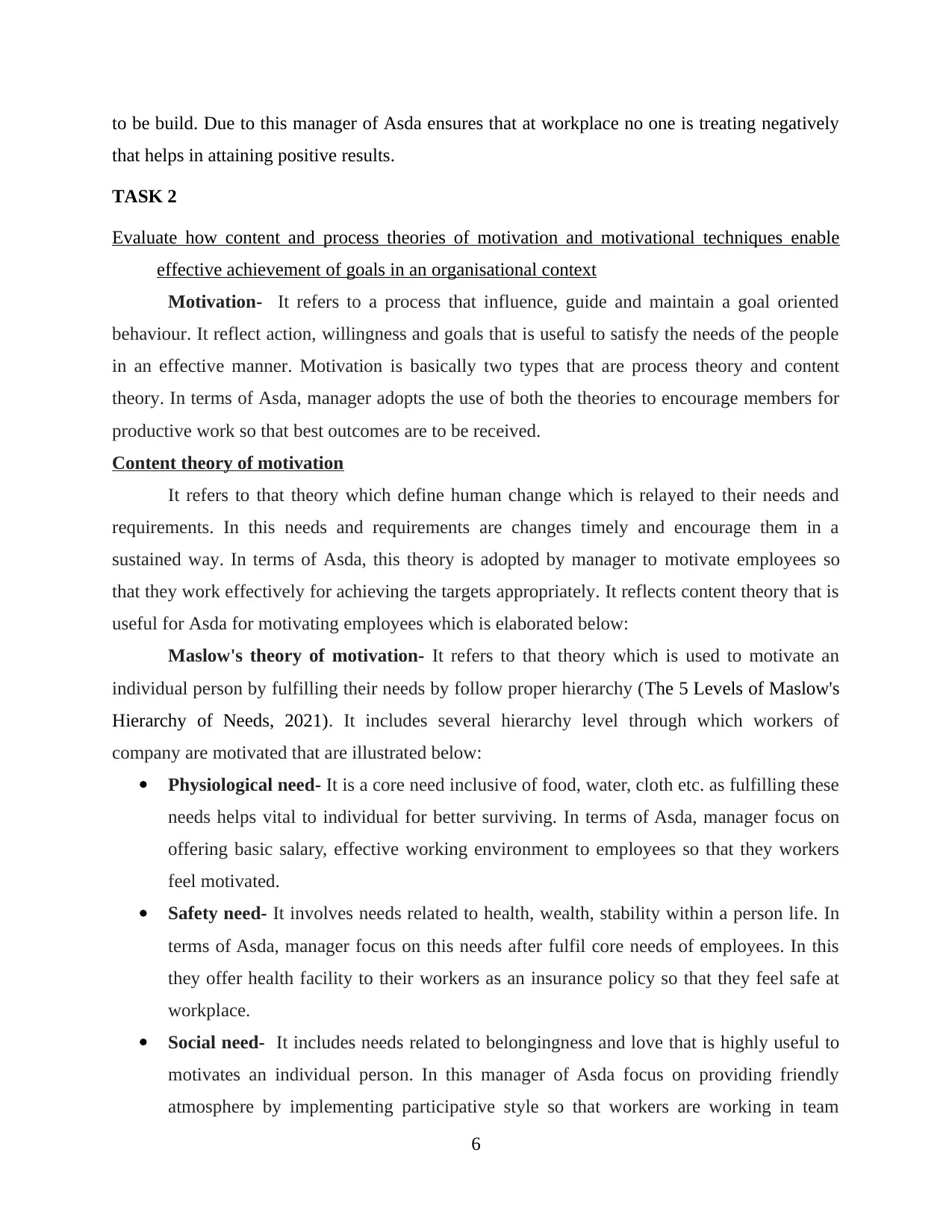
to be build. Due to this manager of Asda ensures that at workplace no one is treating negatively
that helps in attaining positive results.
TASK 2
Evaluate how content and process theories of motivation and motivational techniques enable
effective achievement of goals in an organisational context
Motivation- It refers to a process that influence, guide and maintain a goal oriented
behaviour. It reflect action, willingness and goals that is useful to satisfy the needs of the people
in an effective manner. Motivation is basically two types that are process theory and content
theory. In terms of Asda, manager adopts the use of both the theories to encourage members for
productive work so that best outcomes are to be received.
Content theory of motivation
It refers to that theory which define human change which is relayed to their needs and
requirements. In this needs and requirements are changes timely and encourage them in a
sustained way. In terms of Asda, this theory is adopted by manager to motivate employees so
that they work effectively for achieving the targets appropriately. It reflects content theory that is
useful for Asda for motivating employees which is elaborated below:
Maslow's theory of motivation- It refers to that theory which is used to motivate an
individual person by fulfilling their needs by follow proper hierarchy (The 5 Levels of Maslow's
Hierarchy of Needs, 2021). It includes several hierarchy level through which workers of
company are motivated that are illustrated below:
Physiological need- It is a core need inclusive of food, water, cloth etc. as fulfilling these
needs helps vital to individual for better surviving. In terms of Asda, manager focus on
offering basic salary, effective working environment to employees so that they workers
feel motivated.
Safety need- It involves needs related to health, wealth, stability within a person life. In
terms of Asda, manager focus on this needs after fulfil core needs of employees. In this
they offer health facility to their workers as an insurance policy so that they feel safe at
workplace.
Social need- It includes needs related to belongingness and love that is highly useful to
motivates an individual person. In this manager of Asda focus on providing friendly
atmosphere by implementing participative style so that workers are working in team
6
that helps in attaining positive results.
TASK 2
Evaluate how content and process theories of motivation and motivational techniques enable
effective achievement of goals in an organisational context
Motivation- It refers to a process that influence, guide and maintain a goal oriented
behaviour. It reflect action, willingness and goals that is useful to satisfy the needs of the people
in an effective manner. Motivation is basically two types that are process theory and content
theory. In terms of Asda, manager adopts the use of both the theories to encourage members for
productive work so that best outcomes are to be received.
Content theory of motivation
It refers to that theory which define human change which is relayed to their needs and
requirements. In this needs and requirements are changes timely and encourage them in a
sustained way. In terms of Asda, this theory is adopted by manager to motivate employees so
that they work effectively for achieving the targets appropriately. It reflects content theory that is
useful for Asda for motivating employees which is elaborated below:
Maslow's theory of motivation- It refers to that theory which is used to motivate an
individual person by fulfilling their needs by follow proper hierarchy (The 5 Levels of Maslow's
Hierarchy of Needs, 2021). It includes several hierarchy level through which workers of
company are motivated that are illustrated below:
Physiological need- It is a core need inclusive of food, water, cloth etc. as fulfilling these
needs helps vital to individual for better surviving. In terms of Asda, manager focus on
offering basic salary, effective working environment to employees so that they workers
feel motivated.
Safety need- It involves needs related to health, wealth, stability within a person life. In
terms of Asda, manager focus on this needs after fulfil core needs of employees. In this
they offer health facility to their workers as an insurance policy so that they feel safe at
workplace.
Social need- It includes needs related to belongingness and love that is highly useful to
motivates an individual person. In this manager of Asda focus on providing friendly
atmosphere by implementing participative style so that workers are working in team
6
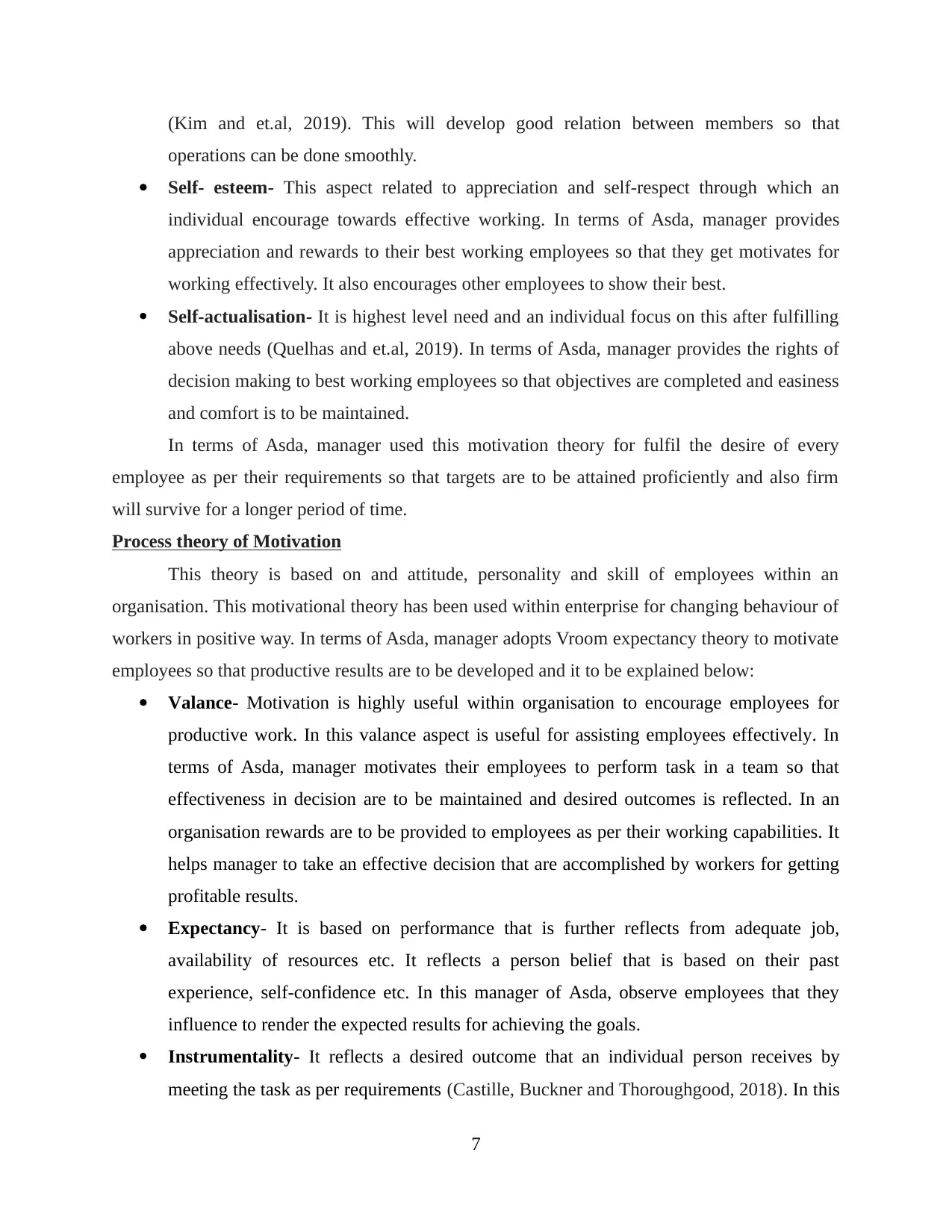
(Kim and et.al, 2019). This will develop good relation between members so that
operations can be done smoothly.
Self- esteem- This aspect related to appreciation and self-respect through which an
individual encourage towards effective working. In terms of Asda, manager provides
appreciation and rewards to their best working employees so that they get motivates for
working effectively. It also encourages other employees to show their best.
Self-actualisation- It is highest level need and an individual focus on this after fulfilling
above needs (Quelhas and et.al, 2019). In terms of Asda, manager provides the rights of
decision making to best working employees so that objectives are completed and easiness
and comfort is to be maintained.
In terms of Asda, manager used this motivation theory for fulfil the desire of every
employee as per their requirements so that targets are to be attained proficiently and also firm
will survive for a longer period of time.
Process theory of Motivation
This theory is based on and attitude, personality and skill of employees within an
organisation. This motivational theory has been used within enterprise for changing behaviour of
workers in positive way. In terms of Asda, manager adopts Vroom expectancy theory to motivate
employees so that productive results are to be developed and it to be explained below:
Valance- Motivation is highly useful within organisation to encourage employees for
productive work. In this valance aspect is useful for assisting employees effectively. In
terms of Asda, manager motivates their employees to perform task in a team so that
effectiveness in decision are to be maintained and desired outcomes is reflected. In an
organisation rewards are to be provided to employees as per their working capabilities. It
helps manager to take an effective decision that are accomplished by workers for getting
profitable results.
Expectancy- It is based on performance that is further reflects from adequate job,
availability of resources etc. It reflects a person belief that is based on their past
experience, self-confidence etc. In this manager of Asda, observe employees that they
influence to render the expected results for achieving the goals.
Instrumentality- It reflects a desired outcome that an individual person receives by
meeting the task as per requirements (Castille, Buckner and Thoroughgood, 2018). In this
7
operations can be done smoothly.
Self- esteem- This aspect related to appreciation and self-respect through which an
individual encourage towards effective working. In terms of Asda, manager provides
appreciation and rewards to their best working employees so that they get motivates for
working effectively. It also encourages other employees to show their best.
Self-actualisation- It is highest level need and an individual focus on this after fulfilling
above needs (Quelhas and et.al, 2019). In terms of Asda, manager provides the rights of
decision making to best working employees so that objectives are completed and easiness
and comfort is to be maintained.
In terms of Asda, manager used this motivation theory for fulfil the desire of every
employee as per their requirements so that targets are to be attained proficiently and also firm
will survive for a longer period of time.
Process theory of Motivation
This theory is based on and attitude, personality and skill of employees within an
organisation. This motivational theory has been used within enterprise for changing behaviour of
workers in positive way. In terms of Asda, manager adopts Vroom expectancy theory to motivate
employees so that productive results are to be developed and it to be explained below:
Valance- Motivation is highly useful within organisation to encourage employees for
productive work. In this valance aspect is useful for assisting employees effectively. In
terms of Asda, manager motivates their employees to perform task in a team so that
effectiveness in decision are to be maintained and desired outcomes is reflected. In an
organisation rewards are to be provided to employees as per their working capabilities. It
helps manager to take an effective decision that are accomplished by workers for getting
profitable results.
Expectancy- It is based on performance that is further reflects from adequate job,
availability of resources etc. It reflects a person belief that is based on their past
experience, self-confidence etc. In this manager of Asda, observe employees that they
influence to render the expected results for achieving the goals.
Instrumentality- It reflects a desired outcome that an individual person receives by
meeting the task as per requirements (Castille, Buckner and Thoroughgood, 2018). In this
7
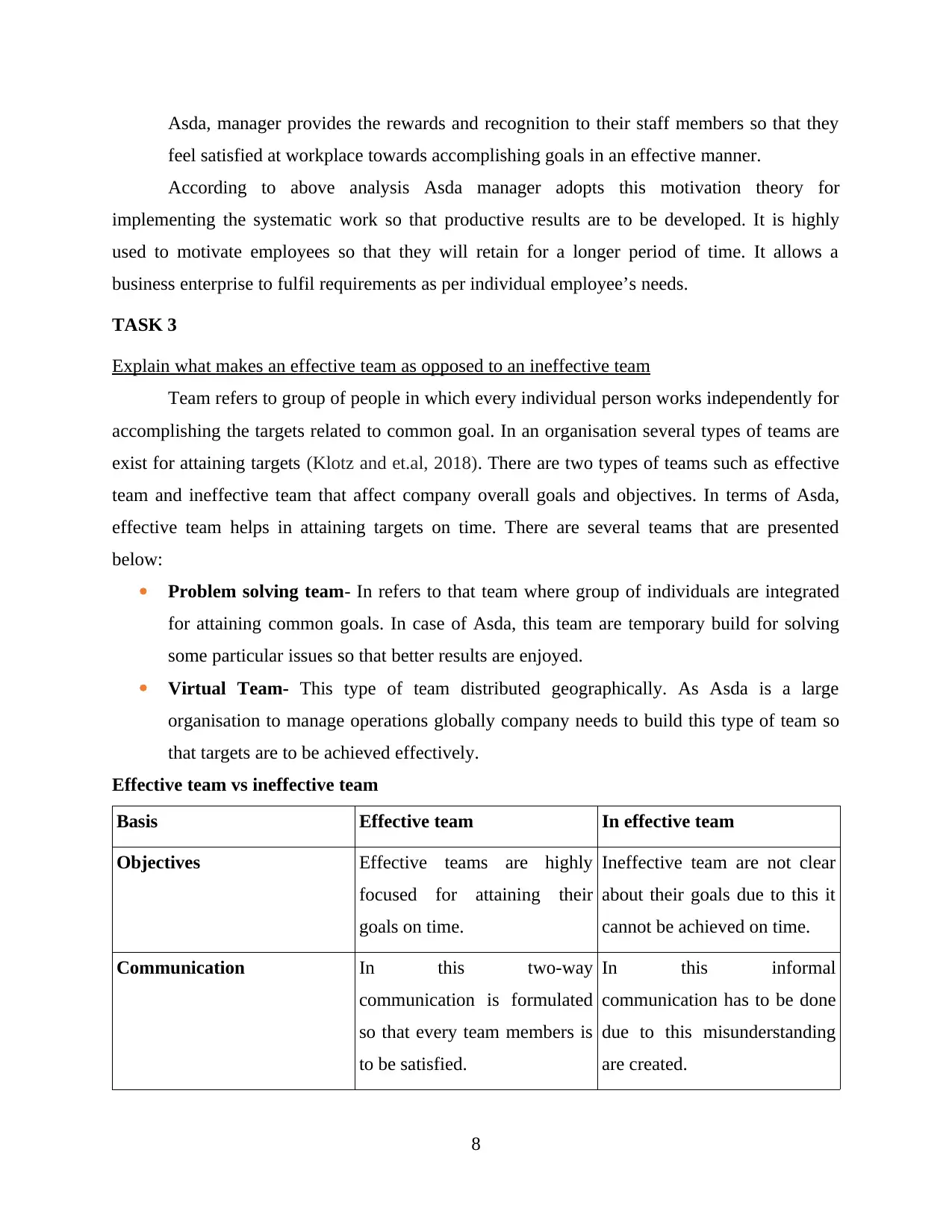
Asda, manager provides the rewards and recognition to their staff members so that they
feel satisfied at workplace towards accomplishing goals in an effective manner.
According to above analysis Asda manager adopts this motivation theory for
implementing the systematic work so that productive results are to be developed. It is highly
used to motivate employees so that they will retain for a longer period of time. It allows a
business enterprise to fulfil requirements as per individual employee’s needs.
TASK 3
Explain what makes an effective team as opposed to an ineffective team
Team refers to group of people in which every individual person works independently for
accomplishing the targets related to common goal. In an organisation several types of teams are
exist for attaining targets (Klotz and et.al, 2018). There are two types of teams such as effective
team and ineffective team that affect company overall goals and objectives. In terms of Asda,
effective team helps in attaining targets on time. There are several teams that are presented
below:
Problem solving team- In refers to that team where group of individuals are integrated
for attaining common goals. In case of Asda, this team are temporary build for solving
some particular issues so that better results are enjoyed.
Virtual Team- This type of team distributed geographically. As Asda is a large
organisation to manage operations globally company needs to build this type of team so
that targets are to be achieved effectively.
Effective team vs ineffective team
Basis Effective team In effective team
Objectives Effective teams are highly
focused for attaining their
goals on time.
Ineffective team are not clear
about their goals due to this it
cannot be achieved on time.
Communication In this two-way
communication is formulated
so that every team members is
to be satisfied.
In this informal
communication has to be done
due to this misunderstanding
are created.
8
feel satisfied at workplace towards accomplishing goals in an effective manner.
According to above analysis Asda manager adopts this motivation theory for
implementing the systematic work so that productive results are to be developed. It is highly
used to motivate employees so that they will retain for a longer period of time. It allows a
business enterprise to fulfil requirements as per individual employee’s needs.
TASK 3
Explain what makes an effective team as opposed to an ineffective team
Team refers to group of people in which every individual person works independently for
accomplishing the targets related to common goal. In an organisation several types of teams are
exist for attaining targets (Klotz and et.al, 2018). There are two types of teams such as effective
team and ineffective team that affect company overall goals and objectives. In terms of Asda,
effective team helps in attaining targets on time. There are several teams that are presented
below:
Problem solving team- In refers to that team where group of individuals are integrated
for attaining common goals. In case of Asda, this team are temporary build for solving
some particular issues so that better results are enjoyed.
Virtual Team- This type of team distributed geographically. As Asda is a large
organisation to manage operations globally company needs to build this type of team so
that targets are to be achieved effectively.
Effective team vs ineffective team
Basis Effective team In effective team
Objectives Effective teams are highly
focused for attaining their
goals on time.
Ineffective team are not clear
about their goals due to this it
cannot be achieved on time.
Communication In this two-way
communication is formulated
so that every team members is
to be satisfied.
In this informal
communication has to be done
due to this misunderstanding
are created.
8
Secure Best Marks with AI Grader
Need help grading? Try our AI Grader for instant feedback on your assignments.
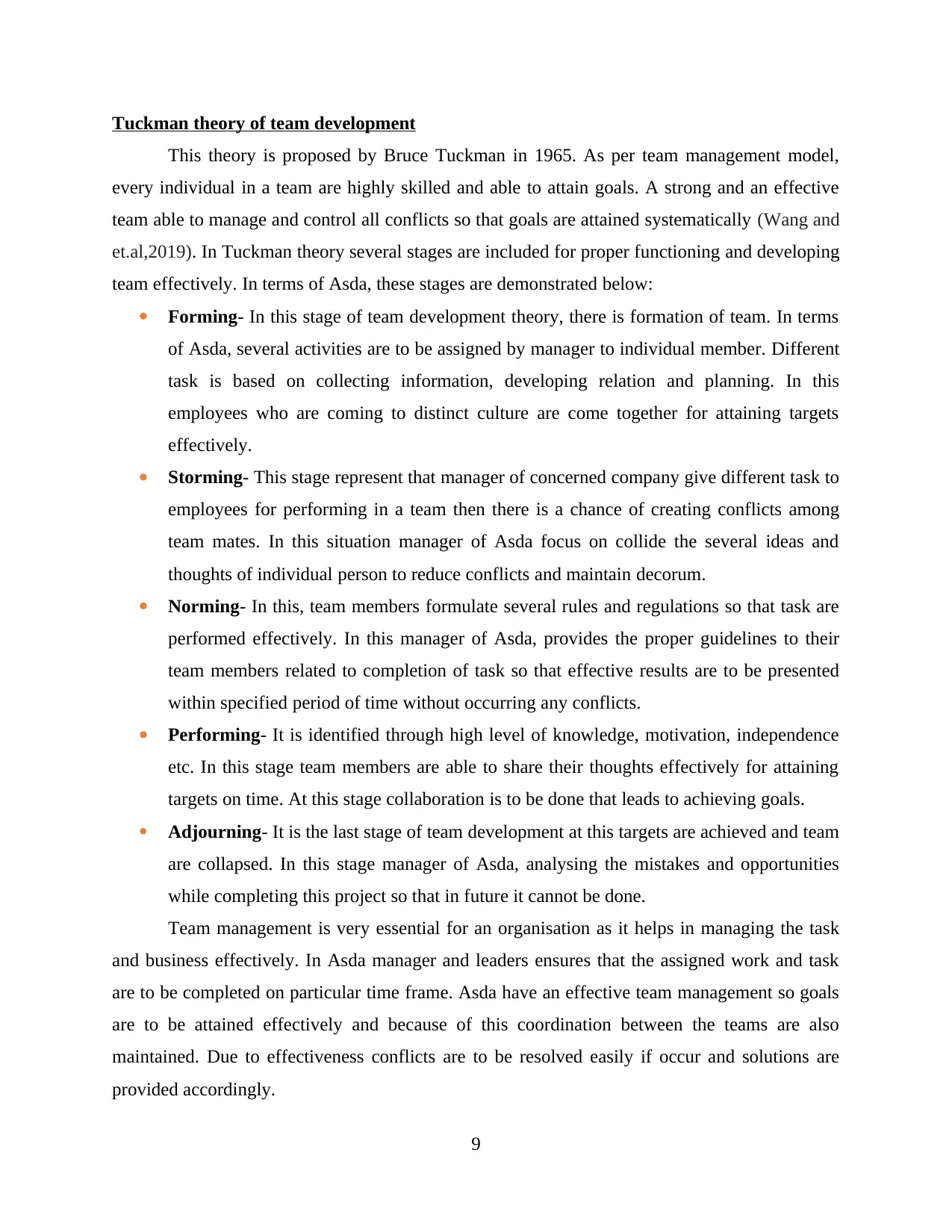
Tuckman theory of team development
This theory is proposed by Bruce Tuckman in 1965. As per team management model,
every individual in a team are highly skilled and able to attain goals. A strong and an effective
team able to manage and control all conflicts so that goals are attained systematically (Wang and
et.al,2019). In Tuckman theory several stages are included for proper functioning and developing
team effectively. In terms of Asda, these stages are demonstrated below:
Forming- In this stage of team development theory, there is formation of team. In terms
of Asda, several activities are to be assigned by manager to individual member. Different
task is based on collecting information, developing relation and planning. In this
employees who are coming to distinct culture are come together for attaining targets
effectively.
Storming- This stage represent that manager of concerned company give different task to
employees for performing in a team then there is a chance of creating conflicts among
team mates. In this situation manager of Asda focus on collide the several ideas and
thoughts of individual person to reduce conflicts and maintain decorum.
Norming- In this, team members formulate several rules and regulations so that task are
performed effectively. In this manager of Asda, provides the proper guidelines to their
team members related to completion of task so that effective results are to be presented
within specified period of time without occurring any conflicts.
Performing- It is identified through high level of knowledge, motivation, independence
etc. In this stage team members are able to share their thoughts effectively for attaining
targets on time. At this stage collaboration is to be done that leads to achieving goals.
Adjourning- It is the last stage of team development at this targets are achieved and team
are collapsed. In this stage manager of Asda, analysing the mistakes and opportunities
while completing this project so that in future it cannot be done.
Team management is very essential for an organisation as it helps in managing the task
and business effectively. In Asda manager and leaders ensures that the assigned work and task
are to be completed on particular time frame. Asda have an effective team management so goals
are to be attained effectively and because of this coordination between the teams are also
maintained. Due to effectiveness conflicts are to be resolved easily if occur and solutions are
provided accordingly.
9
This theory is proposed by Bruce Tuckman in 1965. As per team management model,
every individual in a team are highly skilled and able to attain goals. A strong and an effective
team able to manage and control all conflicts so that goals are attained systematically (Wang and
et.al,2019). In Tuckman theory several stages are included for proper functioning and developing
team effectively. In terms of Asda, these stages are demonstrated below:
Forming- In this stage of team development theory, there is formation of team. In terms
of Asda, several activities are to be assigned by manager to individual member. Different
task is based on collecting information, developing relation and planning. In this
employees who are coming to distinct culture are come together for attaining targets
effectively.
Storming- This stage represent that manager of concerned company give different task to
employees for performing in a team then there is a chance of creating conflicts among
team mates. In this situation manager of Asda focus on collide the several ideas and
thoughts of individual person to reduce conflicts and maintain decorum.
Norming- In this, team members formulate several rules and regulations so that task are
performed effectively. In this manager of Asda, provides the proper guidelines to their
team members related to completion of task so that effective results are to be presented
within specified period of time without occurring any conflicts.
Performing- It is identified through high level of knowledge, motivation, independence
etc. In this stage team members are able to share their thoughts effectively for attaining
targets on time. At this stage collaboration is to be done that leads to achieving goals.
Adjourning- It is the last stage of team development at this targets are achieved and team
are collapsed. In this stage manager of Asda, analysing the mistakes and opportunities
while completing this project so that in future it cannot be done.
Team management is very essential for an organisation as it helps in managing the task
and business effectively. In Asda manager and leaders ensures that the assigned work and task
are to be completed on particular time frame. Asda have an effective team management so goals
are to be attained effectively and because of this coordination between the teams are also
maintained. Due to effectiveness conflicts are to be resolved easily if occur and solutions are
provided accordingly.
9
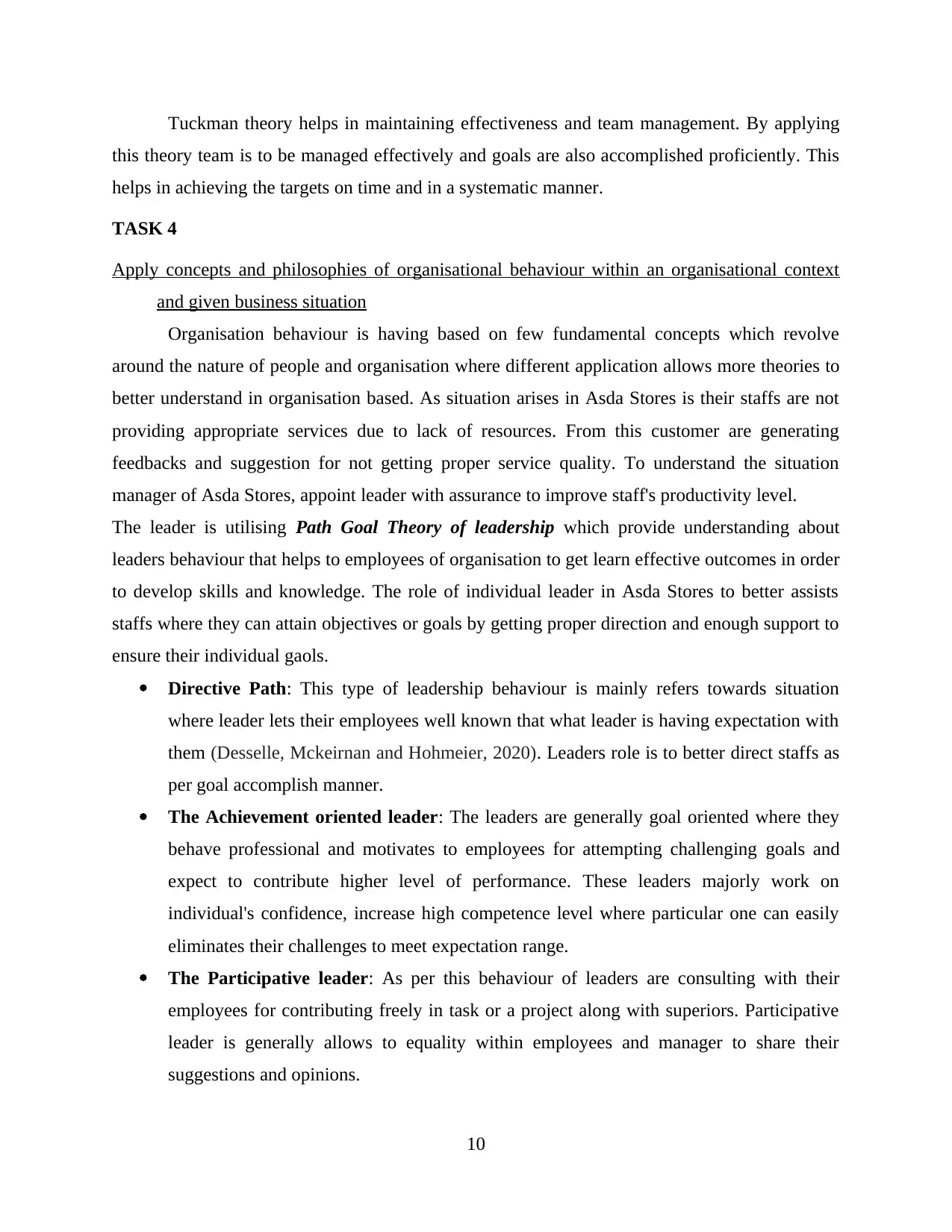
Tuckman theory helps in maintaining effectiveness and team management. By applying
this theory team is to be managed effectively and goals are also accomplished proficiently. This
helps in achieving the targets on time and in a systematic manner.
TASK 4
Apply concepts and philosophies of organisational behaviour within an organisational context
and given business situation
Organisation behaviour is having based on few fundamental concepts which revolve
around the nature of people and organisation where different application allows more theories to
better understand in organisation based. As situation arises in Asda Stores is their staffs are not
providing appropriate services due to lack of resources. From this customer are generating
feedbacks and suggestion for not getting proper service quality. To understand the situation
manager of Asda Stores, appoint leader with assurance to improve staff's productivity level.
The leader is utilising Path Goal Theory of leadership which provide understanding about
leaders behaviour that helps to employees of organisation to get learn effective outcomes in order
to develop skills and knowledge. The role of individual leader in Asda Stores to better assists
staffs where they can attain objectives or goals by getting proper direction and enough support to
ensure their individual gaols.
Directive Path: This type of leadership behaviour is mainly refers towards situation
where leader lets their employees well known that what leader is having expectation with
them (Desselle, Mckeirnan and Hohmeier, 2020). Leaders role is to better direct staffs as
per goal accomplish manner.
The Achievement oriented leader: The leaders are generally goal oriented where they
behave professional and motivates to employees for attempting challenging goals and
expect to contribute higher level of performance. These leaders majorly work on
individual's confidence, increase high competence level where particular one can easily
eliminates their challenges to meet expectation range.
The Participative leader: As per this behaviour of leaders are consulting with their
employees for contributing freely in task or a project along with superiors. Participative
leader is generally allows to equality within employees and manager to share their
suggestions and opinions.
10
this theory team is to be managed effectively and goals are also accomplished proficiently. This
helps in achieving the targets on time and in a systematic manner.
TASK 4
Apply concepts and philosophies of organisational behaviour within an organisational context
and given business situation
Organisation behaviour is having based on few fundamental concepts which revolve
around the nature of people and organisation where different application allows more theories to
better understand in organisation based. As situation arises in Asda Stores is their staffs are not
providing appropriate services due to lack of resources. From this customer are generating
feedbacks and suggestion for not getting proper service quality. To understand the situation
manager of Asda Stores, appoint leader with assurance to improve staff's productivity level.
The leader is utilising Path Goal Theory of leadership which provide understanding about
leaders behaviour that helps to employees of organisation to get learn effective outcomes in order
to develop skills and knowledge. The role of individual leader in Asda Stores to better assists
staffs where they can attain objectives or goals by getting proper direction and enough support to
ensure their individual gaols.
Directive Path: This type of leadership behaviour is mainly refers towards situation
where leader lets their employees well known that what leader is having expectation with
them (Desselle, Mckeirnan and Hohmeier, 2020). Leaders role is to better direct staffs as
per goal accomplish manner.
The Achievement oriented leader: The leaders are generally goal oriented where they
behave professional and motivates to employees for attempting challenging goals and
expect to contribute higher level of performance. These leaders majorly work on
individual's confidence, increase high competence level where particular one can easily
eliminates their challenges to meet expectation range.
The Participative leader: As per this behaviour of leaders are consulting with their
employees for contributing freely in task or a project along with superiors. Participative
leader is generally allows to equality within employees and manager to share their
suggestions and opinions.
10
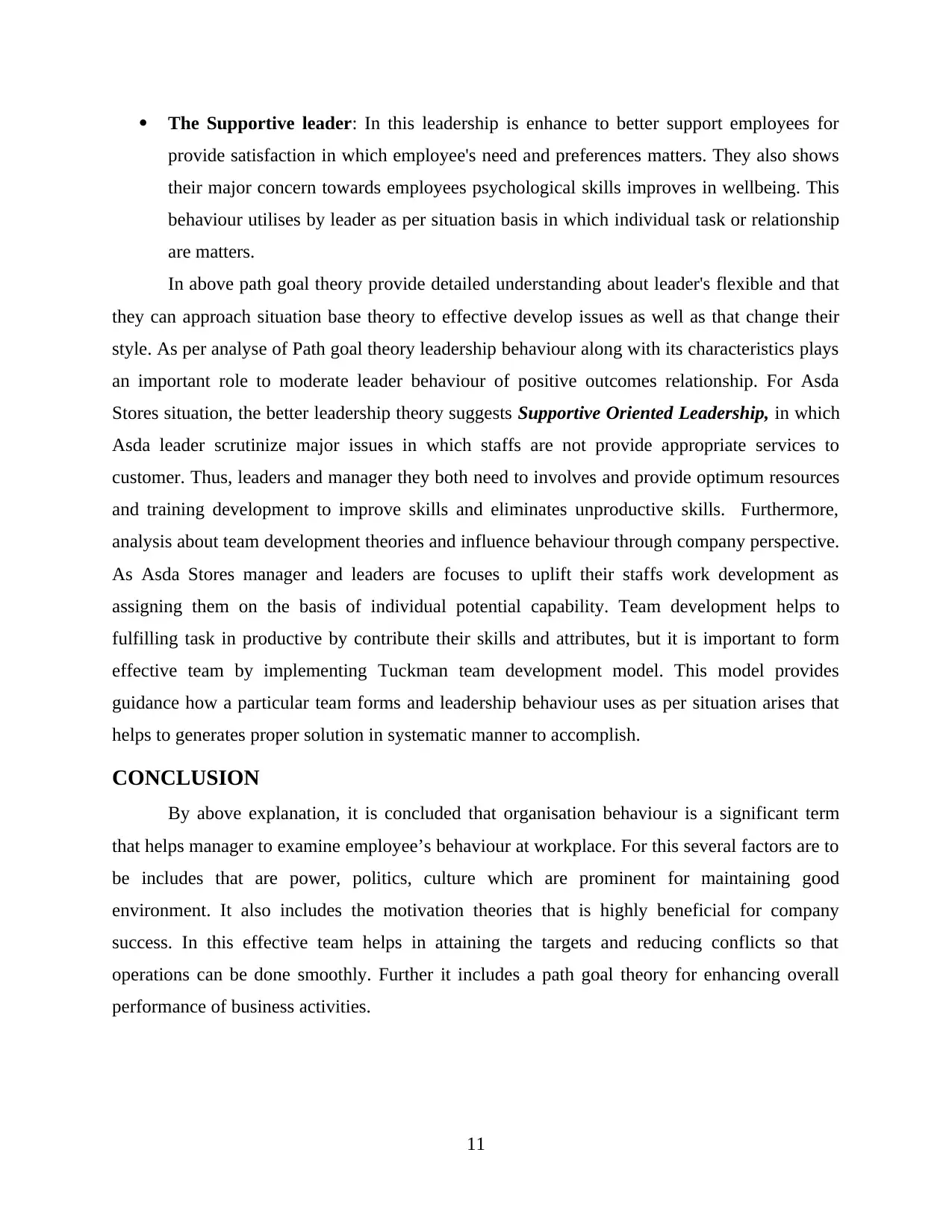
The Supportive leader: In this leadership is enhance to better support employees for
provide satisfaction in which employee's need and preferences matters. They also shows
their major concern towards employees psychological skills improves in wellbeing. This
behaviour utilises by leader as per situation basis in which individual task or relationship
are matters.
In above path goal theory provide detailed understanding about leader's flexible and that
they can approach situation base theory to effective develop issues as well as that change their
style. As per analyse of Path goal theory leadership behaviour along with its characteristics plays
an important role to moderate leader behaviour of positive outcomes relationship. For Asda
Stores situation, the better leadership theory suggests Supportive Oriented Leadership, in which
Asda leader scrutinize major issues in which staffs are not provide appropriate services to
customer. Thus, leaders and manager they both need to involves and provide optimum resources
and training development to improve skills and eliminates unproductive skills. Furthermore,
analysis about team development theories and influence behaviour through company perspective.
As Asda Stores manager and leaders are focuses to uplift their staffs work development as
assigning them on the basis of individual potential capability. Team development helps to
fulfilling task in productive by contribute their skills and attributes, but it is important to form
effective team by implementing Tuckman team development model. This model provides
guidance how a particular team forms and leadership behaviour uses as per situation arises that
helps to generates proper solution in systematic manner to accomplish.
CONCLUSION
By above explanation, it is concluded that organisation behaviour is a significant term
that helps manager to examine employee’s behaviour at workplace. For this several factors are to
be includes that are power, politics, culture which are prominent for maintaining good
environment. It also includes the motivation theories that is highly beneficial for company
success. In this effective team helps in attaining the targets and reducing conflicts so that
operations can be done smoothly. Further it includes a path goal theory for enhancing overall
performance of business activities.
11
provide satisfaction in which employee's need and preferences matters. They also shows
their major concern towards employees psychological skills improves in wellbeing. This
behaviour utilises by leader as per situation basis in which individual task or relationship
are matters.
In above path goal theory provide detailed understanding about leader's flexible and that
they can approach situation base theory to effective develop issues as well as that change their
style. As per analyse of Path goal theory leadership behaviour along with its characteristics plays
an important role to moderate leader behaviour of positive outcomes relationship. For Asda
Stores situation, the better leadership theory suggests Supportive Oriented Leadership, in which
Asda leader scrutinize major issues in which staffs are not provide appropriate services to
customer. Thus, leaders and manager they both need to involves and provide optimum resources
and training development to improve skills and eliminates unproductive skills. Furthermore,
analysis about team development theories and influence behaviour through company perspective.
As Asda Stores manager and leaders are focuses to uplift their staffs work development as
assigning them on the basis of individual potential capability. Team development helps to
fulfilling task in productive by contribute their skills and attributes, but it is important to form
effective team by implementing Tuckman team development model. This model provides
guidance how a particular team forms and leadership behaviour uses as per situation arises that
helps to generates proper solution in systematic manner to accomplish.
CONCLUSION
By above explanation, it is concluded that organisation behaviour is a significant term
that helps manager to examine employee’s behaviour at workplace. For this several factors are to
be includes that are power, politics, culture which are prominent for maintaining good
environment. It also includes the motivation theories that is highly beneficial for company
success. In this effective team helps in attaining the targets and reducing conflicts so that
operations can be done smoothly. Further it includes a path goal theory for enhancing overall
performance of business activities.
11
Paraphrase This Document
Need a fresh take? Get an instant paraphrase of this document with our AI Paraphraser
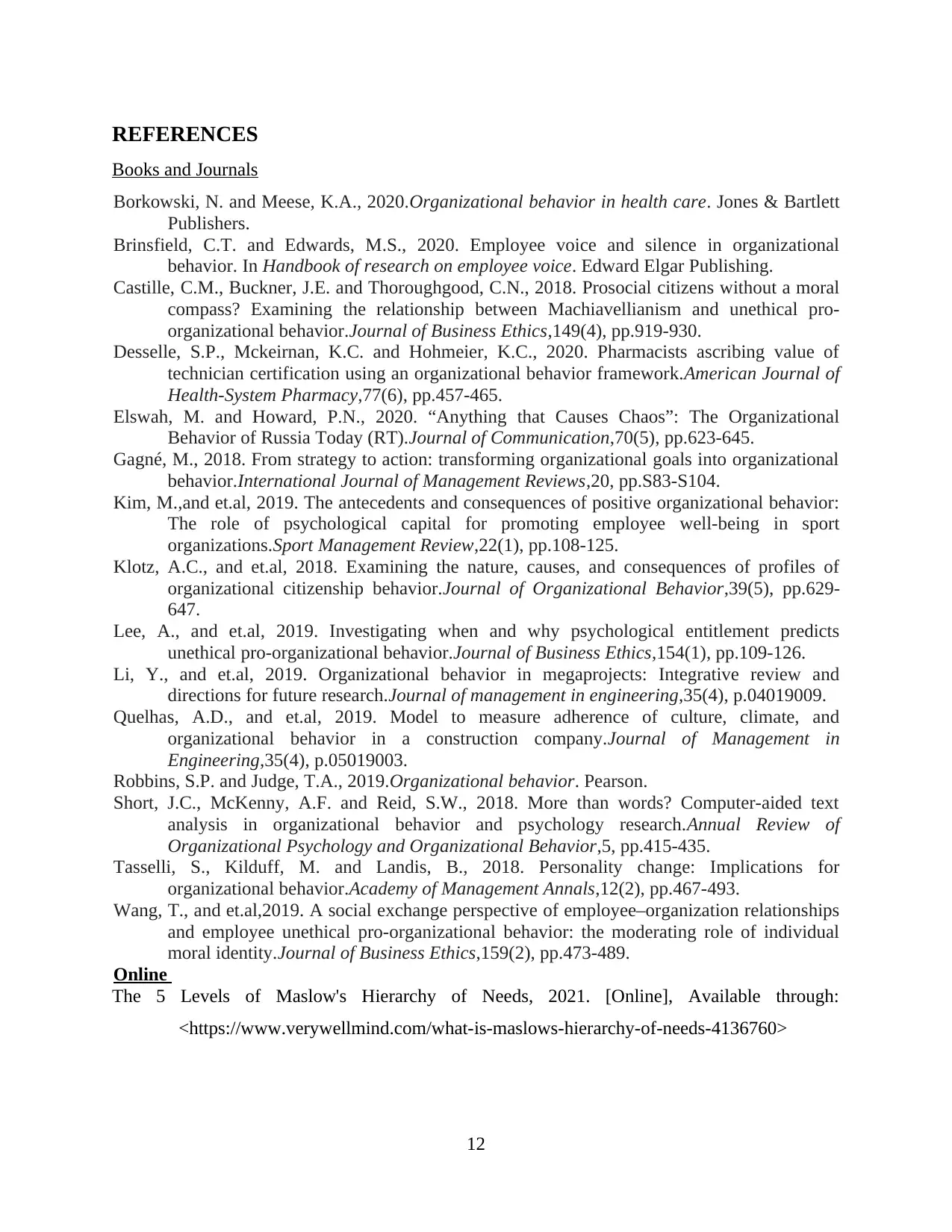
REFERENCES
Books and Journals
Borkowski, N. and Meese, K.A., 2020.Organizational behavior in health care. Jones & Bartlett
Publishers.
Brinsfield, C.T. and Edwards, M.S., 2020. Employee voice and silence in organizational
behavior. In Handbook of research on employee voice. Edward Elgar Publishing.
Castille, C.M., Buckner, J.E. and Thoroughgood, C.N., 2018. Prosocial citizens without a moral
compass? Examining the relationship between Machiavellianism and unethical pro-
organizational behavior.Journal of Business Ethics,149(4), pp.919-930.
Desselle, S.P., Mckeirnan, K.C. and Hohmeier, K.C., 2020. Pharmacists ascribing value of
technician certification using an organizational behavior framework.American Journal of
Health-System Pharmacy,77(6), pp.457-465.
Elswah, M. and Howard, P.N., 2020. “Anything that Causes Chaos”: The Organizational
Behavior of Russia Today (RT).Journal of Communication,70(5), pp.623-645.
Gagné, M., 2018. From strategy to action: transforming organizational goals into organizational
behavior.International Journal of Management Reviews,20, pp.S83-S104.
Kim, M.,and et.al, 2019. The antecedents and consequences of positive organizational behavior:
The role of psychological capital for promoting employee well-being in sport
organizations.Sport Management Review,22(1), pp.108-125.
Klotz, A.C., and et.al, 2018. Examining the nature, causes, and consequences of profiles of
organizational citizenship behavior.Journal of Organizational Behavior,39(5), pp.629-
647.
Lee, A., and et.al, 2019. Investigating when and why psychological entitlement predicts
unethical pro-organizational behavior.Journal of Business Ethics,154(1), pp.109-126.
Li, Y., and et.al, 2019. Organizational behavior in megaprojects: Integrative review and
directions for future research.Journal of management in engineering,35(4), p.04019009.
Quelhas, A.D., and et.al, 2019. Model to measure adherence of culture, climate, and
organizational behavior in a construction company.Journal of Management in
Engineering,35(4), p.05019003.
Robbins, S.P. and Judge, T.A., 2019.Organizational behavior. Pearson.
Short, J.C., McKenny, A.F. and Reid, S.W., 2018. More than words? Computer-aided text
analysis in organizational behavior and psychology research.Annual Review of
Organizational Psychology and Organizational Behavior,5, pp.415-435.
Tasselli, S., Kilduff, M. and Landis, B., 2018. Personality change: Implications for
organizational behavior.Academy of Management Annals,12(2), pp.467-493.
Wang, T., and et.al,2019. A social exchange perspective of employee–organization relationships
and employee unethical pro-organizational behavior: the moderating role of individual
moral identity.Journal of Business Ethics,159(2), pp.473-489.
Online
The 5 Levels of Maslow's Hierarchy of Needs, 2021. [Online], Available through:
<https://www.verywellmind.com/what-is-maslows-hierarchy-of-needs-4136760>
12
Books and Journals
Borkowski, N. and Meese, K.A., 2020.Organizational behavior in health care. Jones & Bartlett
Publishers.
Brinsfield, C.T. and Edwards, M.S., 2020. Employee voice and silence in organizational
behavior. In Handbook of research on employee voice. Edward Elgar Publishing.
Castille, C.M., Buckner, J.E. and Thoroughgood, C.N., 2018. Prosocial citizens without a moral
compass? Examining the relationship between Machiavellianism and unethical pro-
organizational behavior.Journal of Business Ethics,149(4), pp.919-930.
Desselle, S.P., Mckeirnan, K.C. and Hohmeier, K.C., 2020. Pharmacists ascribing value of
technician certification using an organizational behavior framework.American Journal of
Health-System Pharmacy,77(6), pp.457-465.
Elswah, M. and Howard, P.N., 2020. “Anything that Causes Chaos”: The Organizational
Behavior of Russia Today (RT).Journal of Communication,70(5), pp.623-645.
Gagné, M., 2018. From strategy to action: transforming organizational goals into organizational
behavior.International Journal of Management Reviews,20, pp.S83-S104.
Kim, M.,and et.al, 2019. The antecedents and consequences of positive organizational behavior:
The role of psychological capital for promoting employee well-being in sport
organizations.Sport Management Review,22(1), pp.108-125.
Klotz, A.C., and et.al, 2018. Examining the nature, causes, and consequences of profiles of
organizational citizenship behavior.Journal of Organizational Behavior,39(5), pp.629-
647.
Lee, A., and et.al, 2019. Investigating when and why psychological entitlement predicts
unethical pro-organizational behavior.Journal of Business Ethics,154(1), pp.109-126.
Li, Y., and et.al, 2019. Organizational behavior in megaprojects: Integrative review and
directions for future research.Journal of management in engineering,35(4), p.04019009.
Quelhas, A.D., and et.al, 2019. Model to measure adherence of culture, climate, and
organizational behavior in a construction company.Journal of Management in
Engineering,35(4), p.05019003.
Robbins, S.P. and Judge, T.A., 2019.Organizational behavior. Pearson.
Short, J.C., McKenny, A.F. and Reid, S.W., 2018. More than words? Computer-aided text
analysis in organizational behavior and psychology research.Annual Review of
Organizational Psychology and Organizational Behavior,5, pp.415-435.
Tasselli, S., Kilduff, M. and Landis, B., 2018. Personality change: Implications for
organizational behavior.Academy of Management Annals,12(2), pp.467-493.
Wang, T., and et.al,2019. A social exchange perspective of employee–organization relationships
and employee unethical pro-organizational behavior: the moderating role of individual
moral identity.Journal of Business Ethics,159(2), pp.473-489.
Online
The 5 Levels of Maslow's Hierarchy of Needs, 2021. [Online], Available through:
<https://www.verywellmind.com/what-is-maslows-hierarchy-of-needs-4136760>
12

13
1 out of 15
Related Documents
Your All-in-One AI-Powered Toolkit for Academic Success.
+13062052269
info@desklib.com
Available 24*7 on WhatsApp / Email
![[object Object]](/_next/static/media/star-bottom.7253800d.svg)
Unlock your academic potential
© 2024 | Zucol Services PVT LTD | All rights reserved.




